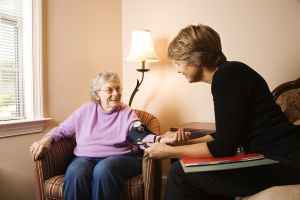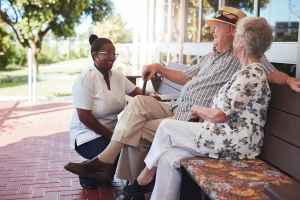Assisted Living in North Carolina
The population of North Carolina has risen by 10% since 2010, according to data from the U.S. Census Bureau. Seniors, or people aged 65 and over, represented a significant share of this rise, growing from 12.9% of the population in 2010 to 16.3% in 2019. Seniors here are attracted to the low cost of living, state tax incentives and warm weather. As this population grows, new facilities and senior care infrastructure are developed.
Assisted living facilities in North Carolina cost an average of $4,000 per month, according to the Genworth 2019 Cost of Care survey. This is just 1.3% less expensive than the national average of $4,051.
More information about the specific costs of living and services and other types of care are available in this guide. It also provides information about financial assistance programs, state regulations regarding assisted living and the quality of life for seniors.
SeniorAdvice's Guide to Assisted Living in North Carolina
The current SeniorScore for North Carolina is 72%. This is equal to the United States average of 72%, so North Carolina ranks right in the middle of the pack. SeniorScore is calculated by analyzing more than 100 data points from an array of private and governmental sources. The score is designed to illustrate the pros and cons of locations across the country for seniors.
SeniorScore™ for North Carolina
 The SeniorScore™ is calculated based on over 100 variables, some of which are shown below. The final score is curved based on a linear curving method. For More info visit senioradvice.com/seniorscore.
The SeniorScore™ is calculated based on over 100 variables, some of which are shown below. The final score is curved based on a linear curving method. For More info visit senioradvice.com/seniorscore.
- North Carolina's SeniorScore™ of 72 is the same as the national average of 72.
- North Carolina has high access to Medicare registered healthcare providers.
- North Carolina has an average number of hospitals within the state.
- North Carolina has a high number of senior living facilities within the state.
- North Carolina has a high number of home healthcare providers operating in the state.
- The average life expectancy in North Carolina is 77.8, compared to the national average of 78.6.
- North Carolina has a high overall property crime rate compared to national averages.
- North Carolina has a high overall violent crime rate compared to national averages.
- 29% of the population in North Carolina are seniors, compared to 29% nationally.
- North Carolina has 551 golf courses in the state.
- North Carolina has a high number of municipal parks throughout the state.
- North Carolina has 3,671 churches in the state.
- The property taxes average 2.07% of total income in North Carolina, which is significantly lower than the national average of 2.79%.
- The property taxes average 0.82% of property value in North Carolina, which is significantly lower than the national average of 1.09%.
- The average sales tax in North Carolina is 7.25%, which is higher than the national average of 6.97%.
- The average state income tax in North Carolina is 4.89%, which is significantly higher than the national average of 3.38%.
- The mean household income in North Carolina is $63,282, which is lower than the national average of $64,580.
- North Carolina's median household income is $48,525, which is lower than the national average of $51,560.
- The average per capita income in North Carolina is $25,311, which is lower than the national average of $25,611.
- Assisted living costs in North Carolina average $38,078 per year, which are lower than the national average of $42,700.
- Nursing home costs in North Carolina average $78,188 per year, which are significantly lower than the national average of $92,481.
- Costs for adult daycare in North Carolina average $13,278 per year, which are significantly lower than the national average of $17,931.
- Costs for home healthcare in North Carolina average $40,740 per year, which are significantly lower than the national average of $46,197.
- The unemployment rate is about 9.67% in North Carolina, which is significantly higher than then national rate of 8.26%.
- The overall cost of living in North Carolina is average compared to national averages.
- 1.03% of the senior population in North Carolina are financially responsible for at least one grandchild.
- North Carolina receives an average of 49.1 inches of rain per year.
- North Carolina has an average annual temperature of 58.7 degrees fahrenheit.
- North Carolina has an average low temperature of 46.7 degrees fahrenheit.
- North Carolina has an average high temperature of 69.9 degrees fahrenheit.
- North Carolina has an average population density of 356 people per square mile.
- North Carolina has an average public school quality ranking.
- North Carolina has a very high public school safety ranking.
- North Carolina has an average graduation rate of 84.23%.
The category General Quality of Life in North Carolina receives a score of 69%, which is the same as South Carolina, lower than Virginia at 72% but higher than Tennessee at 65%. This score is determined by a variety of factors, including climate, population density and public school rankings. North Carolina scores especially well in its public school safety rankings.
While North Carolina has a flat state income tax of 5.25%, which is higher than the national average of 3.5%, payments from social security are completely exempt. Unfortunately, other types of retirement income, including both public and private pensions, are fully taxed.
Some other financial factors that account for North Carolina's SeniorScore include its higher than average sales tax and lower than average property tax. The state also has high unemployment and below-average household income. These factors contribute to a financial score of 65%.
Top Assisted Living Facilities in North Carolina
Located at 493 Piney Ridge Rd, Brookdale Forest City is a senior housing community in Forest City, North Carolina. With approximately 22,000 poeple living in the zip code of 28043, the encompassing area has a dense population. It ...
Carrington Place is a 166 bed senior housing community. It is situated near the Sardis Forest area of Matthews, North Carolina. The facility is in a mostly middle income area, with a median per-household income of $74,386. ...
Sunrise of Cary is a senior housing facility located at 1206 Chatham St in Cary, North Carolina. The encompassing area is densely populated, with about 42,000 individuals residing in the 27513 zip code. With a median household income ...
Universal Health Care-North Raleigh is located around the Northeast Raleigh area of Raleigh, North Carolina. It is a 112 unit nursing home facility. The community is in a mostly middle class area, with a median household income of ...
Peak Resources - Alamance is a 120 bed senior care community situated in Graham, North Carolina. With an average household income of $46,732, the facility is in a primarily middle income area. It has a dense population, with ...
Silver Bluff Village is located at 100 Silver Bluff Dr in Canton, North Carolina. It is a 131 bed senior housing facility. With an average per-family income of $45,405, the facility is in a primarily middle income area. ...
Located at 2778 Country Club Dr in Hampstead, North Carolina, Woodbury Wellness Center is a 112 unit senior housing community. The surrounding area has an average population density, with approximately 19,000 residents in the 28443 zip code. It ...
Located at 1478 River Rd in Winnabow, North Carolina, Brunswick Cove Nursing Center is a 147 unit nursing care facility. The neighboring area is sparsely populated, with about 6,000 people residing in the 28479 zip code. It is ...
Universal Health Care-Fuquay-Varina is a 69 unit nursing home facility. It is located at 410 S Judd Parkway SE in Fuquay Varina, North Carolina. With a median family income of $64,909, the facility is in a primarily middle ...
Five Oaks Manor is located at 413 Winecoff School Rd in Concord, North Carolina. It is a 160 room senior community. With a median per-household income of $61,136, the facility is in a predominantly middle class area. ...
Located at 6590 Tryon Rd in Cary, North Carolina, Cary Health and Rehabilitation is a 120 bed skilled nursing facility. With an average family income of $113,559, the facility is in a primarily upscale area. It has an ...
Maple Grove Health and Rehabilitation Center is located at 308 West Meadowview Rd in Greensboro, North Carolina. It is a 210 unit skilled nursing facility. With approximately 57,000 people residing in the zip code of 27406, the neighboring ...
Located within the Stonewall neighborhood of Winston Salem, North Carolina, Brian Center Health and Retirement is a 40 unit nursing facility. The community is in a largely middle income area, with an average family income of $57,245. It ...
Located near the Enochville neighborhood of Kannapolis, North Carolina, Big Elm Rehabilitation & Living Centers is a 50 unit nursing facility. The community is in a generally middle class area, with an average household income of $39,161. It ...
White Oak Of Waxhaw is a 100 room senior community. It is located at 700 Howie Mine Rd in Waxhaw, North Carolina. The neighboring area is densely populated, with about 46,000 individuals living in the zip code of ...
Brookridge Retirement Community is a 40 unit senior community. It is situated within the Brookridge neighborhood of Winston Salem, North Carolina. The community is in a primarily middle class area, with an average per-family income of $57,245. ...
Sardis Oaks is a 124 bed senior housing facility situated within the Providence Park neighborhood of Charlotte, North Carolina. The encompassing area has a dense population, with around 33,000 poeple living in the zip code of 28270. With ...
Located at 13825 Hunton Ln in Huntersville, North Carolina, Olde Knox Commons at The Villages of Mecklenburg is a 114 bed senior care facility. The encompassing area is heavily populated, with about 53,000 people residing in the 28078 zip ...
Deerfield Episcopal Retirement Community is located close to the Royal Pines area of Asheville, North Carolina. It is a 62 unit senior housing facility. With approximately 30,000 poeple living in the zip code of 28803, the surrounding area ...
Located at 968 East Wait Ave in Wake Forest, North Carolina, Hillside Nursing Center and Rehab is a 130 unit nursing care facility. With about 54,000 residents in the 27587 zip code, the neighboring area is densely populated. ...
The Cost of Assisted Living in North Carolina
With an average monthly rate of $4,000, assisted living in North Carolina costs slightly less than the country's overall average of $4,051. Several neighboring states have less expensive costs than North Carolina, such as South Carolina at $3,500, Georgia at $3,335 and Tennessee at $3,900. Virginia, however, is significantly more expensive, with an average monthly cost of $4,800.
- North Carolina: $4,000
- United States: $4,051
- South Carolina: $3,500
- Tennessee: $3,900
- Georgia: $3,335
- Virginia: $4,000
The Cost of Assisted Living in North Carolina's Top Cities
South Carolina is a diverse state with big cities, small mountain towns and high-end beach communities, causing wide variations in assisted living costs from city to city. Charlotte and Raleigh are the most populous cities in North Carolina, and they are two of the more expensive areas with average monthly costs of $4,583 and $5,325, respectively. Wilmington, which is considered a prime location on the Atlantic, has a monthly average cost of $5,408. Fayetteville has some of the lowest costs in the state at $3,193 per month. Asheville is located in the very western part of the state and also has relatively low costs at $3,325 per month.
- Charlotte: $4,583
- Raleigh: $5,325
- Fayetteville: $3,193
- Wilmington: $5,408
- Asheville: $3,325
Senior Care Cost Comparison in North Carolina
Senior care in the United States is divided into five main categories. In North Carolina, the gap between the most affordable care and the most expensive can be significant. The most affordable option in the state is adult daycare at $1,170 per month, while accommodations at a nursing home are the most expensive at $7.665 per month. Both in-home care and home health care are similarly priced at about $3,813. At $4,000, an assisted living facility is likely to be just a bit more expensive for most seniors in North Carolina.
- Assisted Living: $4,000
- In-Home Care: $3,813
- Home Health Care: $3,813
- Adult Day Care: $1,170
- Nursing Home Care: $7,665
Financial Assistance for Assisted Living in North Carolina
Medicaid Personal Care Services Program
Address: 5540 Centerview Drive, Suite 114, Raleigh, NC 27606
Phone Number: (919) 322-5944
Website: https://medicaid.ncdhhs.gov/providers/programs-and-services/long-term-care/personal-care-services-pcs
While Medicaid does not pay for room and board at assisted living facilities in North Carolina, it can help qualified seniors pay for some of the services they receive within those facilities. The Personal Care Services program provides funding for services related to Activities of Daily Living, which include bathing, dressing, mobility, toileting and eating. Funds may also be used for some cognitive assistance, such as prompting, guiding and coaching. This program can not be used for skilled nursing, pet care, transportation, money management and other related services.
In order to qualify for the PCS program, the family member receiving the benefits must have a chronic condition, developmental disability or cognitive impairment. The applicant must currently be enrolled in Medicaid in the pending status. To complete the process, a medical provider must complete DMA 3051 PCS Request for Services Form.
Special Assistance (SA) Program
Address: 693 Palmer Drive, Raleigh, NC 27699
Phone Number: (919) 733-3983
Website: https://files.nc.gov/ncdhhs/documents/files/SA%20Program%20Brochure%2011.17.16.pdf
Seniors in North Carolina who need help paying for room and board in a licensed assisted living facility may be able to get funding from this state-run program. Once approved, applicants will receive direct funds once per month at a maximum rate of $1,228. Countable monthly income may be subtracted from this total.
Applications for the SA program are processed through each county's social services department. Eligible candidates must be a U.S. citizen or legal alien, be a resident of North Carolina, be 65 or older and meet certain financial requirements. During the application process, a DSS caseworker will help gather documents and determine eligibility. It can take up to 45 days to approve an application.
Special Assistance Adult Care Home Special Care Unit Program
Address: 693 Palmer Drive, Raleigh, NC 27699
Phone Number: (919) 733-3983
Website: https://files.nc.gov/ncdhhs/documents/files/SA%20SCU%20Program%20Brochure%2011.17.16.pdf
Seniors in North Carolina who need more specialized care due to cognitive impairments, such as Alzheimer's or other forms of dementia, may be eligible for assistance through this program. It provides funds for living in special care units within existing ALRs where staff are trained to help seniors with unique needs. The maximum monthly payout for SCU is $1,515.
To be eligible for this program, seniors must exhibit that they require an adult home level of care in a special care unit as verified by a health care provider. They must also be a resident of North Carolina and meet certain income requirements. Each application is processed through the social services department at the county level.
North Carolina Assisted Living Rules and Regulations
North Carolina's Division of Health Service Regulation is responsible for regulating assisted living facilities. These facilities, officially recognized as assisted living residences, are categorized as either adult care homes (ACHs) or multi-unit assisted housing with services facilities. The licensing standards are contained with the North Carolina Administrative Code, Title 10A, Chapter 13, Subchapter F and G.
Scope of Care | At a minimum, an assisted living residence in North Carolina must care for two or more adults and provide one meal per day, housekeeping services and personal care services either directly or through another licensed agency. Adult care homes can offer 24-hour care services and medication management through trained staff, while multi-unit assisted housing provides more hands-on services, including skilled nursing when necessary. |
Care Plan Requirements | Within 72 hours of admission, an assisted living residence must assess each resident using a state-approved form. Within 30 days, they must also perform a complete functional assessment that determines each resident's psychosocial well-being, cognitive status and daily living requirements. Any staff member responsible for conducting assessments must go through training established by the DHHS. |
Medication Management Requirements | Residents are permitted to self-administer medication as long as trained staff assesses that they are competent. When this is not possible, staff can administer medication if they go through competency validation by an RN. These staff members, officially known as medication aides, must periodically complete written exams, clinical evaluations and continuing education courses. |
Staff Requirements | Every assisted living residence in North Carolina must be staffed by an administrator or supervisor at all times. They must also have a dedicated activity director. Regulations also require strict staff to resident ratios. ALRs with 20-30 residents must have 16 hours of personal care aides time on during the first and second shifts, and at least 8 hours on the third shift. All employees must also go through a background check. |
Staff Training Requirements | Administrators at ALRs must complete 30 hours of continuing education every two years. Staff members who provide direct care for residents must complete an 80-hour personal care training and competency evaluation program created by North Carolina officials. Any temporary staff providing care must finish a one-time competency evaluation. |
Medicaid Coverage | For some residents with limited financial means, North Carolina Medicaid can cover the costs of room and board at ALRs. Seniors not eligible for room and board assistance may be able to get help paying for personal care services, such as bathing, housekeeping and grooming. |
Reporting Abuse | Staff who suspect that one or more residents are being abused, neglected or exploited at an assisted living facility are responsible for reporting to local police and North Carolina's Department of Adult Protective Services. Families and residents can file a report by contacting their local social services department. |
Free Assisted Living Resources in North Carolina
Seniors and their families who need information about assisted living facilities in North Carolina can get assistance from the Long Term Care Ombudsman. They can explain long-term care options, advise on selecting a facility, describe the right residents have and provide information about Medicare and Medicaid options. The Long Term Care Ombudsman can also investigate problems related to assisted living facilities, including financial concerns and unfair practices.
Contact: Call (800) 662-7030 for more information, or email [email protected]
North Carolina Agencies
Health and Human Services (HHS)
Address: 2101 Mail Service Center, Raleigh, NC 27699
Phone Number: (919) 855-3400
Website: https://www.ncdhhs.gov/divisions/daas
The Department of Health and Human Services for North Carolina operates the Aging and Adult Services program, which is responsible for promoting the independence and dignity of older adults in the state. They accomplish this by offering training programs, data reports and information and announcements. They also monitor a variety of programs funded by state law and the Older Americans Act, including those related to assisted living. These resources are available to all older adults, their families and other residents with disabilities.
Area Agencies on Aging in North Carolina
There are 16 Area Agencies on Aging in the state of North Carolina. They have five primary responsibilities: advocacy, planning, program and resource development, information brokerage and funds administration quality assurance. Each agency has a wealth of information about local resources for seniors, including directories for services and long-term care.
Each Area Agency on Aging has its own address and contact information, which can be found here. They may be able to help with applications for many benefits and programs.
Veteran Affairs Offices in North Carolina
Veterans in North Carolina who need help with assisted living may be able to get the assistance they need through the state's Department of Military & Veterans Affairs. Monthly pensions through the VA help pay for room and board at adult homes for many residents. Other programs, including housing assistance, may also help pay for assisted living. There are 12 offices staffed by benefits specialists located throughout the state.
The national helpline for the VA is (844) 698-2311. A list of VA offices and hospitals in North Carolina can be found here.
Social Security Offices in North Carolina
Income from Social Security (SSI) helps thousands of seniors in North Carolina pay for assisted living. Residents aged 65 and over who don't currently take advantage of SSI payments can find out if they're eligible by contacting their local Social Security office. Qualifying for Social Security is a prerequisite to many other state and federal aid programs, so applying is an important step. North Carolina is considered part of the Atlanta region for Social Security.
Other Cities in North Carolina


 The SeniorScore™ is calculated based on over 100 variables, some of which are shown below. The final score is curved based on a linear curving method. For More info visit
The SeniorScore™ is calculated based on over 100 variables, some of which are shown below. The final score is curved based on a linear curving method. For More info visit 



















 Your Information is Processing
Your Information is Processing